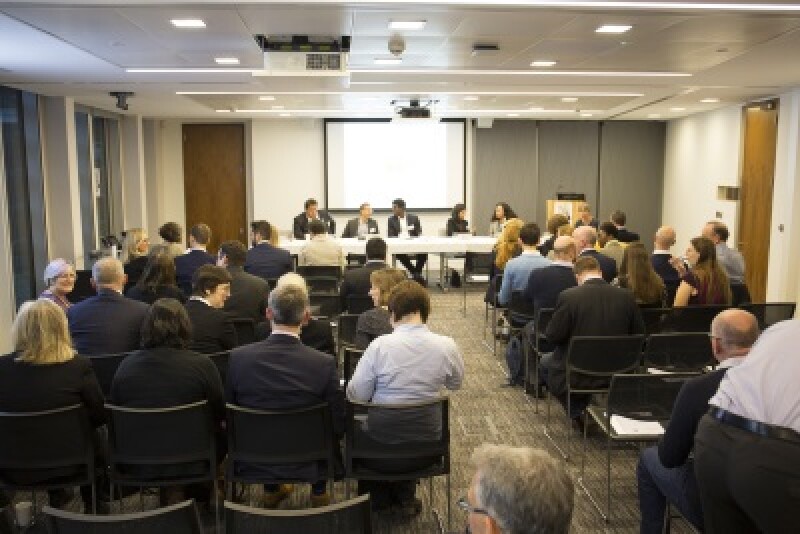
Members of the IP community gathered at Carpmaels & Ransford’s London office to celebrate a year since the launch of IP Inclusive’s Equality, Diversity and Inclusion (EDI) Charter.
This presented an opportunity for industry members to meet and discuss ways to encourage equality, diversity and inclusion in the profession. To date, the Charter has been signed by more than 80 signatories comprising of representatives from IP law, journalism and membership bodies such at CITMA and CIPA.
In early November, IP Inclusive launched a support network for women, Women in IP, and another group for members of the LGBTQ+ community, IP Out.
Lesley Evans, IP Inclusive committee member and chief executive at Haseltine Lake IP led the IP Inclusive party by welcoming guests and presenting an update on various projects. While the event celebrated the progress of IP Inclusive over the past year, it also shone a light on issues such as the under-representation of Black, Asian and Minority Ethnic (BAME) professionals in the IP professions.
A year in review
Speaking on the most recent project, Careers in Ideas, Evans said: “It’s fantastic because there’s been this gap in information about careers in IP. People particularly from professions such a patent attorney, trade mark attorney, patent searcher, an examiner at the patent office - nobody knows about these – they are like secret careers.”
While there are existing schemes targeted at raising awareness of the profession in universities, Evans noted that Careers in Ideas “takes this much lower to the schools level, colleges, people doing A-levels and giving them some different ideas”.
Evans seized the opportunity to thank volunteers from across the IP professions, to whom she said the success of the initiative was owed. She also thanked delegates for their enthusiasm, praised the IP community for positive engagement and highlighted a demand to extend IP Inclusive events from London to other regions in the UK.
Notably, delegates learned that IP Inclusive EDI Charter has been revised to free in-house IP professionals to sign up as a department without the complication of “binding their entire organisation”, promising even greater engagement in the year ahead.
Starting conversations

Maria Petnga-Wallace, diversity adviser at Business in the Community (BITC) gave the keynote speech, presenting highlights from BITC’s 2015 Race at Work report which found that “we are not comfortable talking about race at work”.
Researchers found that “34% of ethnic minority workers and 42% of White employees felt that their colleagues were uncomfortable talking about race”. Petnga-Wallace encouraged colleagues to overcome the fear of discussing race, suggesting that in order to encourage diversity and inclusion in the workplace, it is better to have these seemingly difficult conversation than to remain silent for fear of causing offence.
Petnga-Wallace also announced findings that suggested that “one in five students of science, technology, engineering and mathematics (STEM) subjects in university are from the BAME group”.
She said that this presented an opportunity to reach out to BAME students and promote the IP professions. While a study by the UKRC showed that “similar proportions of white and BAME women obtained undergraduate and postgraduate qualifications in STEM”, it was revealed that BAME women are more likely to then go on to work in STEM occupations.
However “the reverse trend was seen for men with BAME men 28% less likely to work in STEM than white men.” Petnga-Wallace said that the statistics suggested missed opportunities to redirect BAME men in STEM to the IP profession.
The keynote speech followed on to a panel discussion chaired by IP Inclusive leader Andrea Brewster which explored “the unbearable whiteness of IP” and benefits of ethnic diversity in the IP professions.
We all have something to contribute

Delegates were challenged to scrutinise their recruitment and mentoring programmes. Justine Thompson provided a practical illustration of how Baker & McKenzie did this by introducing name-blind CV reviews. She said: “You need to be able to take a long hard look at your hiring process. We have made changes that we are proud of.”
Thompson added that this process will likely be uncomfortable yet crucial, if you desire to build a company culture that reflects today’s diverse society and a more inclusive working environment.
Baker & McKenzie’s Alex Morgan later said that these changes to the firm’s hiring process likely contributed to his hire as associate four years ago. Despite the fact that “there isn’t a preponderance of BAME partners to look up to”, Morgan said that he felt confident about his prospects at the firm.
Deepti Nigam of GE Healthcare described her experience in the IP profession as overwhelmingly positive, saying that she had not suffered any discrimination at work or ever felt left out. Mike Ribeiro of Norton Rose Fulbright highlighted the importance of having champions of IP at the top of each organisation saying: “Innovation comes out of diversity, so if you haven’t got a CEO or a chairman in your organisation who is willing to shout ‘diversity’…you will struggle - and in the area of IP, that’s kind of fatal.”
Ribeiro identified the need to raise awareness in the workplace that “people who are not white are not from a different planet, but we all have the ability to contribute to the business”. Overall, all delegates agreed that it is in the best interest of all to promote diversity.
Find out more information about IP Inclusive here. You can also follow the Twitter account at @IPInclusive. To join Managing IP and others and become a signatory of IP Inclusive’s Equality, Diversity and Inclusion Charter, click here. If you would like to volunteer with Careers in Ideas and help to raise awareness of the IP profession, follow this link to find out more.
Photographs by Hannah Fish, marketing manager, Carpmaels & Ransford










